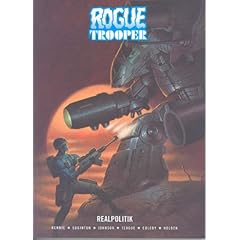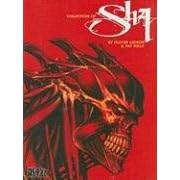
Rogue Trooper is a perennial 2000 AD franchise featuring a blue-skinned clone soldier, gone AWOL to track down a traitor and wandering a chemically-wasted future landscape. The character was dusted off for a new series of adventures by Gordon Rennie to tie in to Rebellion's spiffy video game in 2005. Rennie wrote most of the episodes in this book, with a final three-parter tackled by Ian Edginton and Steve Pugh. Overall, they are not bad, and the structured, overarching plot is more engaging than the patchy, episodic nature of the character's 1980s series. There are a couple of stumbles, mainly built around a ponderous "they were soldiers and they died heroes and war is hard" two-parter that reads like Garth Ennis-lite, but there are some great new characters devised for the run, and some great black and white artwork from contributors like PJ Holden and Dylan Teague. Recommended.

I've always been curious about the comics that Pat Mills writes for European publishers. If I understand correctly, many of these appear as annual 48-page serialized editions in France, and are later translated back to English to run in the pages of Heavy Metal.
Sha orginally appeared in France as three books from 1997-99 and tells the story of a police officer in the ugly, dystopian future city of New Eden trying to solve the horrific murders of some corporate overlords. These "men" are actually demonically possessed avatars of constantly-reincarnating beings who, centuries before, had put a witch to the stake, and she called upon a spirit of vengeance called Sha to avenge her death...
I don't want to call it Mills by the numbers, but this certainly follows familiar patterns from Mills' other work in the 1990s. Especially in the first storyline, the way the villains emphasize their fetish for technology and firepower only to be thwarted with minimal effort by Sha's use of bizarre magic is very reminiscent of his early '90s series Finn. The crusading, repugnant Christians remind me of Torquemada and his crew from Nemesis the Warlock, as does the use of constantly-reincarnated lives. And there is much, much more one could see.
It's certainly not bad, and Oliver Ledroit's glorious depiction of such a horrible future will keep any reader's attention. Yet there's much here which, to my overcooked, over-analytical eye, looks a lot like work I've read before and follows a very similar template, with little variety in emphasis or tone. Recommended for Mills devotees.
(Originally posted September 24, 2008 at hipsterdad's LJ.)
No comments:
Post a Comment